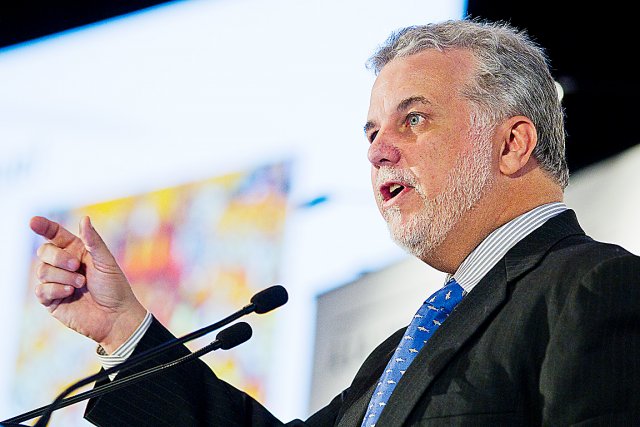The premier of Quebec, Philippe Couillard, has announced he was “serious” about implementing an unconditional basic income for all Quebec residents. This universal basic income, inspired by countries such as Finland, would replace all of the government’s current aid in revenue, such as welfare and tax credits. The Quebec Minister of Employment and Social Solidarity, François Blais, a proponent of this measure, said that it would be possible to initiate this reform in a span of 20 to 25 years. Universal basic income is a measure that all governments should consider as a potential solution to extreme poverty. But in this scary era of austerity, this aspiration to universal basic income is paradoxical.
It would take at least 20 years to implement basic income, but the government has, in less than two years, carried out severe budget cuts in several social programs. One such austerity measure is Bill 70, which can reduce welfare cheques if applicants refuse to enlist in programs to find a job or get more training. While it is easy to say that universal basic income is a ‘serious’ option, it seems like Couillard wants to make citizens forget about the harsh reality he has inflicted upon Quebecers. Thinking seriously about universal income does not help the many Quebecers who, at this very moment, have a considerably diminished quality of life due to the politics of austerity. Although basic income might reduce basic inequalities in day-to-day life such as housing, transport, and food, it cannot replace social programs.
During these 20 years before the implementation of a basic income scheme—while the province continues its austerity measures—standards of living will continue to diminish. First-time welfare applicants, who could have psychological problems, will have more difficulty getting enough money to survive due to Bill 70. Drug addicts will be left to themselves because financial assistance for rehabilitation has decreased from $750 to $200 a month, one of the biggest detox centres in Quebec, the Mélaric Centre, has closed, and 43 of the center’s patients have no other choice but to return to prison, even if it costs more for the government to jail them than assist them. Fields that are traditionally dominated by women, such as in teaching and nursing, will suffer a freeze in salaries. In that line of thought, Françoise David, spokesperson of Quebec Solidaire, said that “the government of Quebec has inflicted upon hundreds of thousands of female workers longer working hours and decreased salaries.”
Basic income has its flaws as a policy. It is not the solution to all social problems. It only helps the most basic needs, such as food and housing. While this is an important achievement as currently one in six Canadian children face hunger every year, improving basic needs fulfillment does not solve other variables of socioeconomic inequality. Even with basic income, budget cuts in kindergartens due to austerity will affect kids in their lives later on. Basic income will not provide kids and teenagers who need the assistance of specialists, such as speech therapists and psychologists, to succeed. For example, a basic income scheme wouldn’t address the needs of autistic children, who only receive four hours of covered behavioural intervention instead of the necessary twenty. Small and medium-sized enterprises would become less financially stable as tax credits are cut as well. Workers who suffer a work-related accident or disease would still have less available compensation due to budget cuts in the Commission de la santé et de la sécurité du travail (CSST). The universal basic income is not the solution if there are no social programs in health and education.
Yet the real victims of these times of austerity—doctors and corporations—would be safe under a basic income scheme. Health and Social Services’ Minister Gaétan Barrette has offered a raise of “42 per cent for specialists and 34 per cent for general practitioners.” Bombardier received a bailout of “$1.3 billion no questions asked” to save the C-Series division that employs around 2,000 employees. These employees would be better off with a government-paid sabbatical year while finding another job, instead of supporting an unsustainable line of airplanes. After receiving the bailout, Bombardier has just announced the layoff of 2,400 employees in Quebec. In the end, the bailout did not even secure the jobs of Quebecer employees.
Even if universal basic income is a serious proposition, it cannot replace all social services that have been damaged by tremendous budget cuts. This ‘seriousness’ seems like a poisoned chalice; it looks good but it cannot solve everything, especially in health and education. The government’s obsession with a zero-deficit budget, which is the cause of so many cuts in social programs, looks to be more ideological than an actual economic necessity for Quebec. According to economist Pierre Fortin, austerity measures “could considerably damage economic growth, social stability and public administration’s effectiveness.” All in all, austerity measures are irresponsible in the economic and social sense. The government of Quebec needs to put a stop to austerity before seeking to resolve social inequalities through basic income. The timeline for its implementation is too long, and its results too ambiguous.











As a trans woman who lives on less than the US poverty line, let alone the Canadian LICO, and faces persistent and widespread employment discrimination, no, what Basic Income does is constrain the ability of neoliberals to govern the proles. My roommate could have had Basic income from birth and never been in a position where extreme poverty and abuse caused her to break down and require disability income in the first place. Basic Income means classists can no longer dictate to the poor the means by which they fight their poverty.